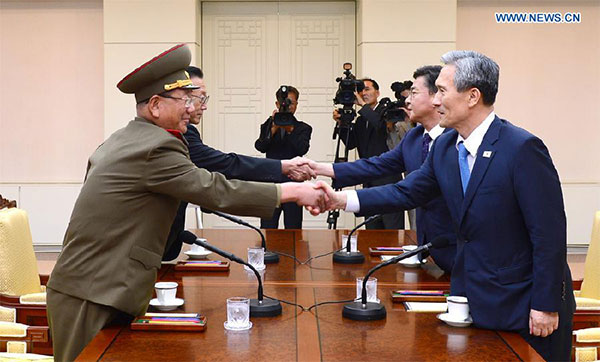Restraint key to preventing tensions between DPRK and ROK escalating
(China Daily) Updated: 2015-08-24 08:34
 |
|
Hwang Pyong So (front, L), director of the General Political Bureau of the Korean People's Army of the Democratic People's Republic of Korea (DPRK), and Kim Kwan-jin (front R), chief of the National Security Office of the Republic of Korea (ROK), shake hands prior to their meeting in the truce village of Panmunjom, Aug 22, 2015. [Photo/Agencies] |
The Republic of Korea and the Democratic People's Republic of Korea resumed their high-level emergency contact in the village of Panmunjom inside the Demilitarized Zone on Sunday, less than a day after their first-round of talks, which lasted for nearly 10 hours. The meetings come amid tensions heightened by a cross-border exchange of fire on Thursday that was triggered by the ROK resuming propaganda broadcasts. Comments:
We urge the two sides to maintain calm and exercise restraint, properly deal with the current situation through contact and dialogue, and stop any action that will likely intensify tensions. China is willing to work with all the parties concerned for peace and stability on the peninsula.
Hua Chunying, China's Foreign Ministry spokesperson, Aug 21
Although it is difficult to predict whether the bilateral high-level talks will bear fruit or not, one thing is certain: The stern uncompromising stance adopted by both sides may deal a blow to peace and stability on the Korean Peninsula, as well as the worldwide consensus on peaceful development. Seoul and Pyongyang should keep cool heads and refrain from acting on impulse before things spin out of control. The international community should also take adequate precautions to keep the regional tensions from escalating.
Gao Haorong, an expert on Korean studies, Aug 22
For the time being, neither the DPRK nor the ROK are prepared for an all-out war. The latest military frictions between both countries will not necessarily lead to an explosive situation, because they have dealt with and defused similar clashes before. Peace and reconciliation, not escalated tensions, will benefit all parties involved in the peninsula issues, especially Seoul and Pyongyang.
Global Times, Aug 22
The periodic exchange of harsh words on the Korean Peninsula is one thing and has become all too common. But the exchange of artillery fire is another thing altogether and reminds all of us of the dangerous potential for tensions to escalate out of control. When it's happened in the past, there have been dangers of escalation and the US has had to restrain South Korea. It's a very dangerous situation, though it could die down, and chances are it will die down.
Joel Wit, a former American diplomat, Aug 22











